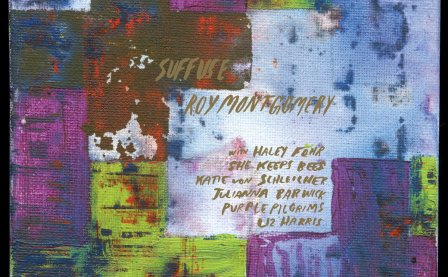The shift in a musician’s recording identity can be significant, but only occasionally does it involve an alias in which a new spirit and a new story are embodied. John Fahey and Blind Joe Death were two sides of the same coin occupied by a then-young student of blues and American folk forms (Blind Joe Death became part of Fahey’s many-stranded mythology). As composer Edward Larry Gordon’s path became more spiritually clear and focused, he took on the name Laaraji. It’s not entirely obvious what path songwriter Haley Fohr’s “Jackie Lynn” will occupy, or whether Lynn will supersede Fohr’s Circuit Des Yeux moniker, but this new project — conceived with the sonic assistance of Cooper Crain (Cave, Bitchin’ Bajas) — marks a significant, if measured, departure from her previous work.
While guitar and voice are present, the bulk of the music on this brief EP is produced through analog electronics, orchestrated with equal attentiveness to Krautrock and New Age-inspired weight, yet delivered with energized, post-punk-informed sparseness. Lyrically, the 20-odd minute yarn Fohr (or Lynn) has spun is that of a semi-transient cocaine dealer whose path has taken her from Franklin, Tennessee to Chicago’s South Side. The first half begins rather inauspiciously — Lynn’s story is as yet unclear, and the opening “Bright Lights” swiftly moves from loping drum machines and 12-string strums to a layered brilliance, with voices, electric guitar, and keyboard washes surrounding the husky optimism of the protagonist’s delivery. It doesn’t take too long for “Chicken Picken” to outlay the details of Lynn’s character, a brisk electronic clop holding the pace amid pulsing chordal waves and a cottony upper-register bounce before a synthesizer lead emerges somewhere out of Laurie Spiegel’s back pocket, soon dying amid canned applause. “Smile” finds Fohr’s operatic tenor in full flight, Farfisa and drum machines giving stark outline to a pair of weary characters whose business and personal life is oddly intertwined, given a striking amount of heft by a wrenching, deep vibrato.
The second act is tougher in execution — pulsing, icy banks of synthesized movement and organ grit are reminiscent of Edgar Froese directing an early Rhys Chatham juggernaut and carry Fohr’s terse, resonant delivery from the plot of “Alien Love” to the open-throated backstory of “Franklin, TN.” The latter couples suspended, reverberant strums to a relentless percussive clip and biting layers, as Jackie Lynn recounts a narrow escape, inhabiting the casual murk of Bruce Springsteen or Alan Vega. Following a brief sine interlude, “Jackie” closes with a quavering epilogue, 6- and 12-string guitars providing a stark, lysergic, and folky shade, upturned with gentle electronic accents. Nothing in the story of Jackie Lynn wastes time, which is both a strength and a weakness — the compositions are fascinatingly layered and the lyrics paint a compelling, odd story, but each nugget feels like a taste of something much larger. Clean and expertly rendered, it will be interesting to hear what Haley Fohr’s musical world will next inhabit, though for now, Jackie Lynn has left her mark.
More about: Circuit des Yeux, Haley Fohr, Jackie Lynn




